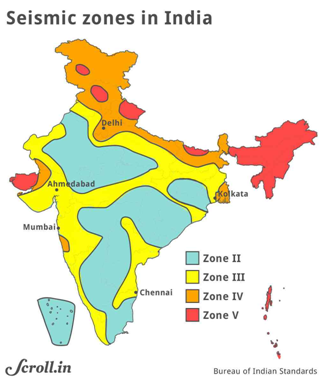

Context
Micro tremors have been helping release tectonic stress and protecting India from a devastating event, experts said and asserted that the country has seen a paradigm shift towards effective response and mitigation.
About
Should India be concerned?
- India is witnessing micro tremors regularly which, in turn, is helping release tectonic stress and offering protection from the possibility of a devastating event.
- The triple junction on India's western side near the border with Pakistan is continuously releasing stress due to the occurrence of micro-level earthquakes.
- There are a few earthquakes of magnitude 4 and 5 as well.
|
Triple Junction
|
How prone is India to earthquakes?
- India is located in a seismically active region. India is divided into four seismic zones based on the potential for earthquake activity in each region.
- According to the Ministry of Earth Sciences, 59 per cent of India's land mass is prone to earthquakes.
- Zone V is seismically the most active region, while Zone II is the least.
- Around 11 per cent of the country's area falls in Zone V, 18 per cent in Zone IV and 30 per cent in Zone III and the remaining in Zone II.
- The zones are used to guide building codes and construction practices.

|
Zone 5 is the zone where the most intense earthquakes occur, while the least intense quakes take place in zone 2. Approximately 11% of the country's area falls in Zone 5, 18% in zone 4, 30% in zone 3 and the remaining in zone 2. |
Is India ready?
- India is well-prepared to deal with the fallout of large-scale earthquakes as it has a dedicated, well-equipped and trained force in the form of the National Disaster Response Force (NDRF).
|
National Disaster Response Force (NDRF)
|


